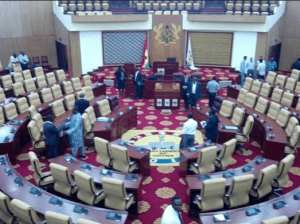Parliament calls for strict implementation of Children’s Act
 Parliament has recommended the strict implementation of the Children’s Act to ensure that children are not used in the “kayayei” (head porter’s) trade.
Parliament has recommended the strict implementation of the Children’s Act to ensure that children are not used in the “kayayei” (head porter’s) trade.
The Committee on Gender and Children, which made the recommendation, said the budget allocation to the Ministry of Gender, Children and Social Protection should be increased to enable it tackle all socio-cultural issues effectively and efficiently.
Laadi Ayii Ayamba, Chairperson of the Committee, presenting the report of the Committee on “the kayayei phenomenon in Ghana” to House on Friday, noted that the phenomenon has gained a national dimension and requires national attention and a comprehensive policy to bring it down to the barest minimum.
“The Ministry … should be given the needed support in developing policies that would help in the reduction in the levels of migration,” she said.
The report was occasioned by a directive by the Speaker in February 2014, to the Committee for research, study, consideration and report to the House on the kayayei situation was made, following a grand interest on the issue after sector Minister Nana Oye Lithur had made a statement on it to the House.
In that statement, the sector Minister provided a background to the rural-urban migration in Ghana, the current nature of the “kayayei” phenomenon, reasons why people migrate to the regional capitals to engage in the kayayei, challenges face by the kayayei, the national response to the phenomenon and the way forward.
According Laadi Ayamba, who is also the MP for Pusiga in the Upper East Region, the Committee observed that there has been no national survey on the phenomenon although the Ministry conducted a study on the phenomenon in Accra in 2009, with two non-governmental organisations- People’s Dialogue and the Ghana Federation of Urban Poor.
However, there were variance in the figures as the Ministry put the number of head porters in Accra at 2,300 while that of the NGOs stated a figure of between 15,000-17,000 head porters in Accra.
The porters are mostly located in markets across the capitals especially at the Agbogbloshie, Mallam Atta, Darkuman, and Ashaiman markets, and Tema Station.
There are also others in Sekondi- Takoradi, Kumasi, Tamale and Kintampo.
The report said some researchers have made the observation that 80 per cent of the head porters are females mostly from the Northern parts of Ghana and 20 per cent are males engaged in truck pushing, sale of scraps, loading and off-loading of goods from trucks.
“Eighty-six per cent of them are not married and 41 per cent are single but have children. Fifty per cent of them have no formal education, 5 per cent of them have no formal education, and 54 per cent of them are from Dagomba, Sissala and Mamprusi extraction from Northern regions. Fifty eight per cent of them were engaged in farming prior to migrating to Accra”.
Most of them are school dropouts.
Among the key factors for the prevalence of the phenomenon are poverty and financial difficulties experienced by young girls in the northern parts of the country, climate change which has seriously impacted on rain fed agriculture in the north and inability to complete education due to lack of funds.
Others are irresponsible parentage and harmful socio-cultural practices like early marriages and adoption, inadequate schools, teachers and lack of jobs.
The kayayei are faced with the challenges of rape, sexual abuse, long working hours, harassment and extortion by city officials, lack of access to good health, poor education and lack of accommodation, drug trafficking and maltreatment.
Source: GNA
